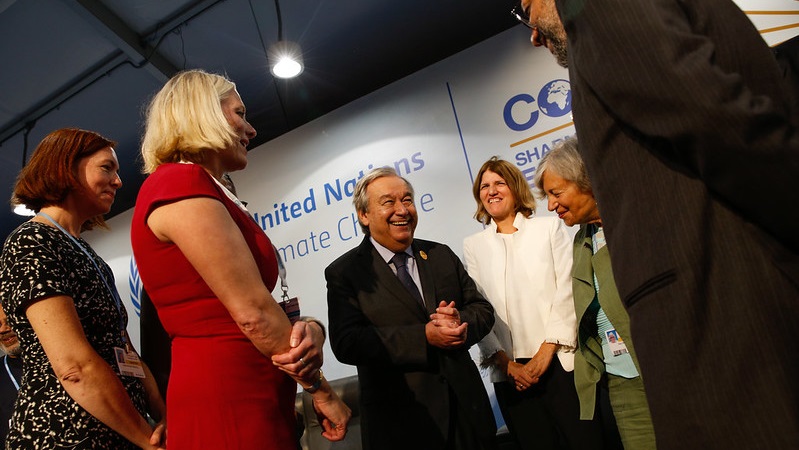Late last year, the UN-convened High Level Expert Group (Hleg) I was a member of released a significant set of recommendations designed to seize on the growing momentum of net zero commitments.
At COP27 in Sharm El Sheikh, Egypt, we proposed a clear set of principles for delivering on net zero pledges. The Hleg ‘standard’ seized on existing progress while also addressing the areas that badly need cleaning up.
The goal was to fix what was broken while energising what works. Its a challenging dual task, but what in the world of climate action isn’t double-sided in this way?.
Companies cannot claim, for instance, to be aligned with net zero while being a driving force for long-lived new fossil fuel infrastructure.
EU to push for fossil fuel phaseout ‘well ahead of 2050’ at Cop28
Nor can they be seen to have a credible commitment if they pack carbon offsets into their near-term emissions calculations.
Our recommendations can be boiled down to two core principles: absolute emissions need to fall right away, and businesses, financial institutions, cities and regions need to use their significant influence outside of direct emissions to enable a just and sustainable pathway to achieve nearly zero emissions in just a few decades.
No, it isn’t a small task. But we’re firmly past the mid-point of 2023, and I think it is fair to say that something feels different about corporate climate action. There’s next phase for net zero, and we’re seeing it take shape.
The first notable trend is the continued coalescence of what has previously been a broad and sometimes daunting array of differing standards, guidelines, alliances and initiatives around the solid centre of gravity provided by last year’s Hleg report.
For instance, the ‘Race to Zero’ campaign, which has successfully brought a vast number of companies to the startling line, was recently announced as due to fold into the UNFCCC’s ‘Recognition and Accountability’ framework, with the details due to be announced soon.
The coalescing of standards was a key finding of Oxford University’s 2023 update of their sizable net-zero-tracking database. “The [net zero tracker] also evaluated the evolving voluntary standards landscape, particularly the convergence of the ecosystem of voluntary standards, guidelines and accountability frameworks, which have emerged to steer targets and plans toward the requirements of science”.
We are not at the net zero singularity quite yet – they also found inconsistencies among those who judge the quality of net zero targets, particularly around issues of offsetting, equitable target setting, financing and corrosive lobbying.
After “sleepless nights”, governments strike deal on Green Climate Fund strategy
A report just released by authors at Columbia University digs into financing and lobbying. Bottom-up design of voluntary initiatives have resulted in an inflated perception of climate action.
Metrics and targets are misaligned from what we know is needed to limit warming. Their findings are a dire listing of missed opportunities and fabricated success. We can’t afford those indulgences when heat records are broken four days in a row.
The Columbia report also lays out a pathway for those in control of large amounts of capital to both align internally with net zero commitments but to also use their incredible power and influence to move beyond the spreadsheets and the megatonnes. They can move, if they want to.
As we move into the second half of the year, a clear narrative around offsets has emerged. There is a growing trend of companies opting to focus on real emissions reductions rather than carbon offsets.
Last year, an investigation by Bloomberg listed companies moving away from carbon offsets, including Lyft, Vattenfall, Etsy, Delivery Hero and Credit Suisse. Other examples include British construction company BAM, Airlines Easyjet and JetBlue, Ben & Jerrys, Lendlease, Ikea, Australian property fund manager EG, the global copper industry body, and major tech company Atlassian.
Just recently, Nestle announced they’ll no longer lean on claiming to be ‘carbon neutral’, and that they’ll move away from offsets too. Though companies like Nestle still secret their offsetting within their own value chain (‘insetting’), these are still positive steps towards a situation where we can look at the task of rapid emissions reductions more squarely in the face.
And another signal of the shifting tide was the recent release of Voluntary Carbon Markets Integrity Initiative (VCMI)’s Claims Code, which essentially bars the use of offsets to falsely claim the neutralisation of ongoing company emissions.
“Carbon credits purchased and retired to make a VCMI Claim are not used for offsets”, Ana Carolina Szklo, VCMI’s Technical Director, told Environmental Finance.

The number of legal cases over alleged corporate greenwash is on the rise (Grantham Institute)
The standards are tightening and the loopholes are dissipating. And those digging their heels in face regulation and legal action against greenwashing that doubled in 2021 and 2022.
Are we in the next phase of net zero? We can’t say it with confidence quite yet. But the game has changed in a material way since the release of our guidelines last year.
What we know with high confidence is that the burden now falls onto companies to enact change that results in immediate, noticeable reductions in their climate footprint, while they pay increased attention to the way they wield their power outside of the company.
The cheats corporations have used to avoid facing the problem head on? They’re on the chopping block – that, we can say for sure.
Amanda Starbuck is Program Director at the Sunrise Project, and was a member of the UN Secretary General High-Level Expert Group on Net Zero Pledges.
